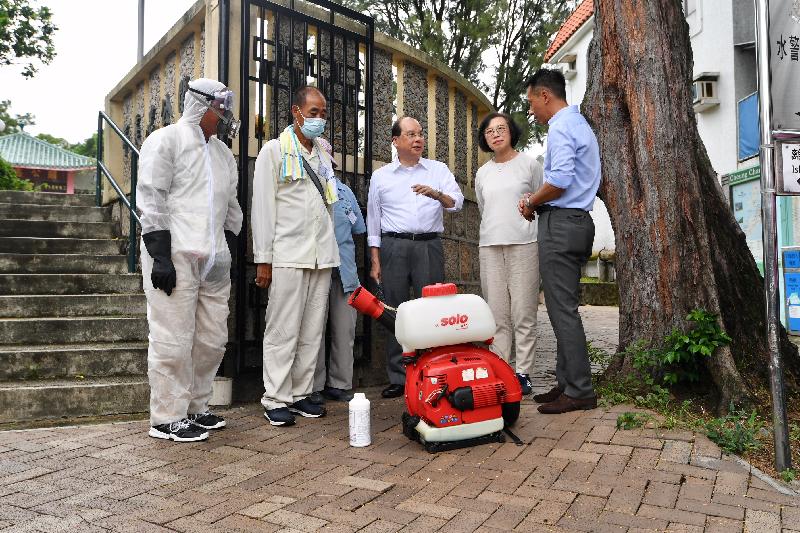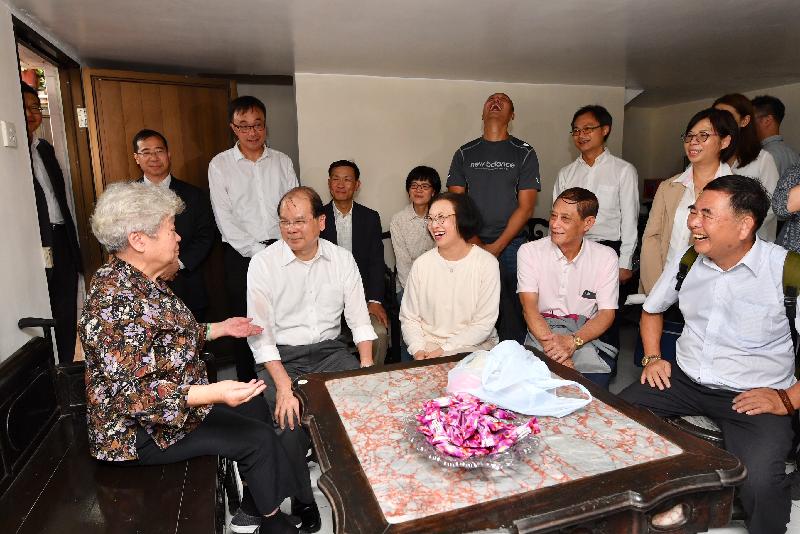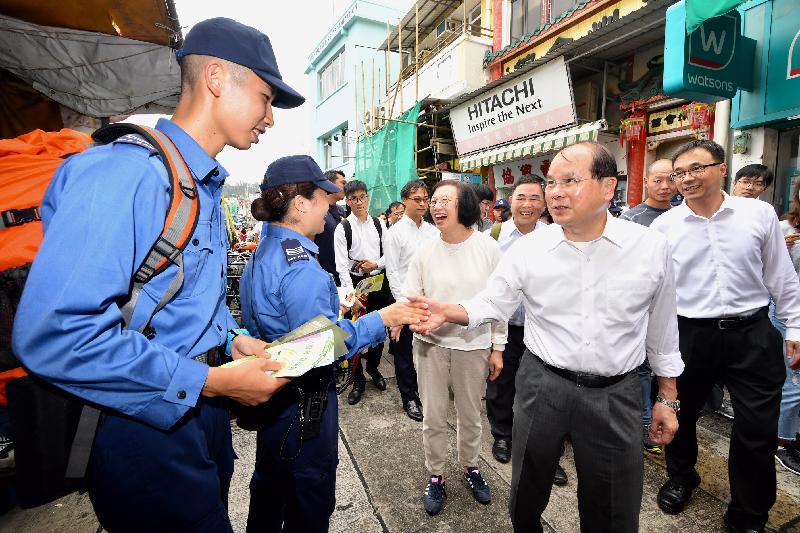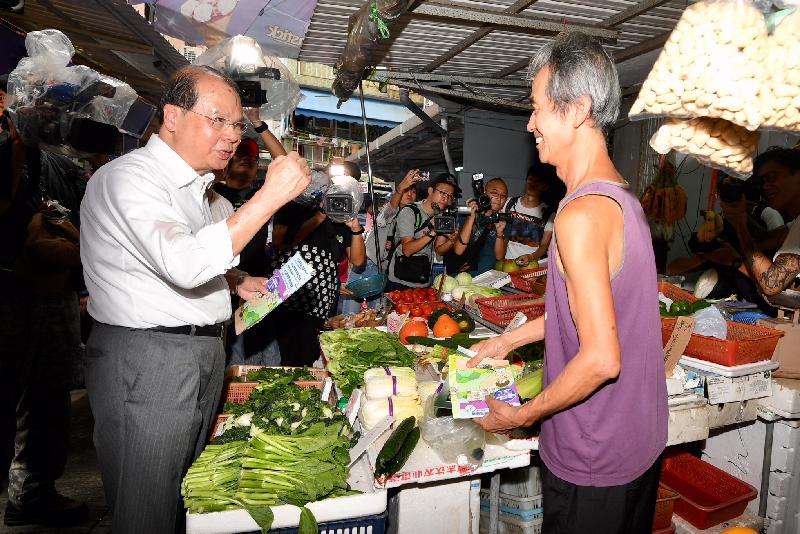In view of the confirmed local dengue fever cases on Cheung Chau, the Chief Secretary for Administration, Mr Matthew Cheung Kin-chung, and the Secretary for Food and Health, Professor Sophia Chan, today (August 30) went to Cheung Chau to view the progress of the Government's anti-mosquito work and visited residents and a school there during the visit.
Mr Cheung said, "The Government is very concerned about the 27 confirmed local dengue fever cases recorded in Hong Kong so far this year. Among them, the patients of nine confirmed cases reside in or visited Cheung Chau during the incubation period. We will spare no effort in conducting all-out intensive anti-mosquito operations in the hope of curbing the spread of dengue fever with the concerted efforts of district organisations. The new school year will begin next week and therefore I have come to Cheung Chau with Professor Chan to check the implementation of mosquito prevention and control work.
"At the Pest Control Steering Committee meeting in mid-August, I had already instructed the relevant bureaux and departments to make reference to the modus operandi of the Food and Environmental Hygiene Department (FEHD) to carry out anti-mosquito work in areas under their purview, with enhanced strength, coverage and intensity, for co-operating with this territory-wide anti-mosquito operation in a concerted manner.
"Further to the joint operation on August 22, the Food and Health Bureau, the Department of Health, the FEHD, the Home Affairs Department, the Civil Aid Service, the Islands District Council and the Cheung Chau Rural Committee carried out another joint operation on Cheung Chau today to strengthen the dissemination of anti-mosquito messages to residents as well as the anti-mosquito measures at their homes and surroundings."
Professor Chan said, "Co-operation and support of the public is vital to control the spread of dengue fever. Mosquito control requires the concerted efforts of all sectors of the community and members of the public should maintain personal hygiene and prevent mosquito breeding in their everyday lives. I appeal to all sectors of the community to join hands with the Government to take effective measures to prevent the problem of mosquito infestation."
She added, "In view of the implementation of the All-out Anti-mosquito Operation by the FEHD in all districts, we have allocated extra funding of $4 million to the FEHD to facilitate the additional anti-mosquito work to be carried out by the District Environmental Hygiene Offices, as well as to strengthen the co-operation with the environmental hygiene committees of the District Councils to eradicate the black spots of mosquito breeding grounds in the districts immediately. The funding will be used for the purchase of ultra-low-volume foggers, the engagement of additional Pest Control Teams and the enhancement of publicity and educational work on mosquito prevention and control. We will also closely monitor the needs of districts and make corresponding measures in a timely manner.
"Furthermore, in order to accelerate the announcement of the ovitrap index for Aedes albopictus with a view to enhancing the awareness of residents in taking mosquito preventive measures, the FEHD will adopt a new arrangement in the release of the ovitrap index starting from September. The figures for individual districts will usually be uploaded to the FEHD website in phases days after the collection of ovitraps so that members of the public may obtain the latest information on the situation of mosquito infestation as early as possible."
During the operation, the Chief Secretary for Administration and the Secretary for Food and Health inspected the mosquito prevention and control work carried out by FEHD staff. Earlier, the FEHD gradually extended its anti-mosquito operation on Cheung Chau from areas within a 500-metre radius of the residences and activity areas of the patients to other places where houses are located and more visitors appear. The FEHD has also inspected the camp sites and schools on Cheung Chau since last week and reminded them to take mosquito control measures.
Mr Cheung and Professor Chan also visited Cheung Chau Government Secondary School and a household. They said they were pleased to learn that the school and the household had proactively taken anti-mosquito measures in the campus and at home. The officials stressed that co-operation and participation of the community and residents, in addition to the efforts of the government departments, are crucial to effective mosquito control over the territory.
The CHP appeals to members of the public not to visit Lion Rock Park during the closure period in order to prevent contracting dengue fever. Scientific studies have shown that infected persons can transmit the virus to mosquitoes through mosquito bites even if they remain asymptomatic or before their onset of symptoms, leading to further spread of the disease. Hence, people who have visited Lion Rock Park are advised to apply insect repellent for 14 days after their last visit, and those with dengue fever symptoms should seek medical advice as early as possible. People who reside in or visit Cheung Chau are advised to apply insect repellent during their stay and continue applying it for 14 days after their last day of stay to prevent infection and secondary spread.
The public should call 1823 in case of mosquito problems and may visit the dengue fever pages of the Centre for Health Protection (CHP) and its Travel Health Service, the latest Travel Health News, tips for using insect repellents, the CHP Facebook Page and YouTube Channel, and the FEHD's Guidebook on Control and Prevention of Mosquito Breeding for more information.
Follow this news feed: East Asia











